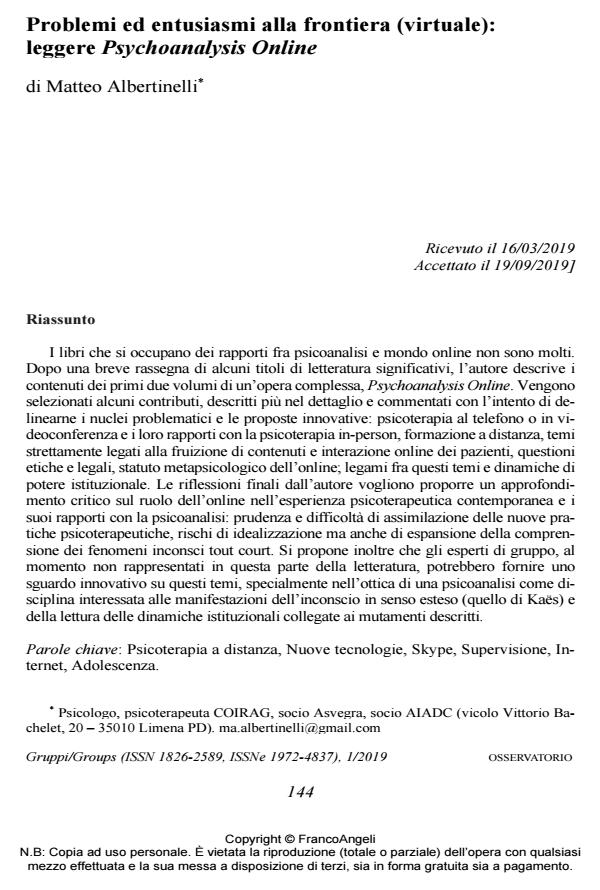Issues and thrills at the (virtual) frontier: reading Psychoanalysis Online
Journal title GRUPPI
Author/s Matteo Albertinelli
Publishing Year 2019 Issue 2019/1 Language Italian
Pages 10 P. 144-153 File size 176 KB
DOI 10.3280/GRU2019-001011
DOI is like a bar code for intellectual property: to have more infomation
click here
Below, you can see the article first page
If you want to buy this article in PDF format, you can do it, following the instructions to buy download credits

FrancoAngeli is member of Publishers International Linking Association, Inc (PILA), a not-for-profit association which run the CrossRef service enabling links to and from online scholarly content.
There are not many books on the relationship between psychoanalysis and the online world. After a brief review of some significant literature titles, the author de-scribes the content of the first two volumes of a complex ouvre, Psychoanalysis Online. The author selects some of the articles, which he describes in detail and analyses with the intent of outlining their problematic nuclei and innovative pro-posals: telephone or videoconference psychotherapy and their relationship to in-person psychotherapy, distance education, some themes closely related to pa-tients’ online content fruition and interaction, ethical and legal issues, metapsycho-logical foundation of the online dimension; relationship between these themes and institutional power dynamics. In his final considerations , the author wishes to of-fer a critical in-depth analysis no the role of the online dimension in contemporary psychotherapeutic experience and its relationship with psychoanalysis: caution and assimilation difficulties towards new psychotherapy experiences, risks of ide-alization but also an expansion of the understanding of tout court unconscious phenomena. The author then proposes that experts on groups, who are as today unrepresented in this part of literature, could provide the scientific community with their original insight on these topics, especially from the point of view of psychoa-nalysis as a discipline interested in the manifestations of the unconscious in its ex-tended meaning (that of Kaës) and that of the analysis of the institutional dynam-ics linked to the illustrated changes.
Keywords: Teletherapy, New technologies, Skype, Supervision, Internet, Adoles-cence.
- Albertinelli M. (2017). Recensione al volume: “Kaës R. L’estensione della psicoanalisi. Per una metapsicologia del terzo tipo”. Gruppi, XVIII, 1: 121-125.
- DOI: 10.3280/GRU2017-001010
- Albertinelli M. (2018). Edifici fascisti e rappresentazione della violenza. Regressione ed elaborazione psichica nell’individuo, nel gruppo e nella civiltà. Gruppi, XIX, 1: 107-123.
- DOI: 10.3280/GRU2018-001007
- Anderson G.C. (2013). A Male Analyst Reflects on his Teleanalysis when a Candidate. In: Scharf J.S., Psychoanalysis Online. London: Karnac.
- Aryan A. & Carlino R. (2013). The Power of the Establishment in the Face of Change: Psychoanalysis by Telephone. In: Scharf J.S., Psychoanalysis Online. London: Karnac.
- Bakalar N.L. (2013). Transition from In-person Psychotherapy to Telephone Psychoanalysis. In: Scharf J.S., Psychoanalysis Online. London: Karnac.
- Bucholz M.B. & Kächele H. (2015). Emergency SMS-based Intervention in Chronic Suicidality: a Research Project using Conversation Analysis. In: Scharf J.S., Psychoanalysis Online 2. London: Karnac.
- Cebulko S. (2013). Internet Pornography as a Soure of Marital Distress. In: Scharf J.S., Psychoanalysis Online. London: Karnac.
- De Varela (2015). Cyberspace as Potential Space. In: Scharf J.S., Psychoanalysis Online 2. London: Karnac.
- Dettbarn I. (2013). Skype as the Uncanny Third. In: Scharf J.S., Psychoanalysis Online. London: Karnac.
- Eissler K.R. (1950). Il “Chicago Institute of Psychoanalysis” e il sesto periodo di sviluppo della tecnica psicoanalitica. Psicoterapia e Scienze Umane, XVIII, 3: 5-33 (I parte) e 4: 5-35 (II parte), 1984.
- Kaës R. (2015). L’extension de la psychanalyse. Pour une métapsychologie du troisième type. Paris: Dunod (trad. it.: L’estensione della psicoanalisi. Per una metapsicologia di terzo tipo. Milano: FrancoAngeli, 2016).
- Kernberg O. (1996). Trenta modi per distruggere la creatività dei candidati in psicoanalisi. GliArgonauti, 76: 1-14, 1998.
- Lemma A. (2018). The Digital Age on the Couch: Psychoanalytic Practice and New Media. New York: Routledge.
- Marzi A. (2013). Psicoanalisi, Identità e Internet. Esplorazioni nel cyberspace. Milano: FrancoAngeli.
- Neumann D.A. (2013). The Frame for Psychoanalysis in Cyberspace. In: Scharf J.S., Psychoanalysis Online. London: Karnac.
- Pilecki A. (2015). Transitional Space: the Role of Internet Community for Transgender and Gender non-conforming Patients. In: Scharf J.S., Psychoanalysis Online 2. London: Karnac.
- Scharf J.S. (2013). Psychoanalysis Online. London: Karnac.
- Scharf J.S. (2015a). Psychoanalysis Online 2. London: Karnac.
- Scharf J.S. (2015b). Intimacy, Sexuality and Pornography Online. In: Scharf J.S., Psychoanalysis Online 2. London: Karnac.
- Sehon C.M. (2015). Teleanalysis and Teletherapy for Children and Adolescents? In: Scharf J.S., Psychoanalysis Online 2. London: Karnac.
- Tao L. (2015). Teleanalysis: Problems, Limitations, and Opportunities. In: Scharf J.S., Psychoanalysis Online 2. London: Karnac.
- Vanderpool D. (2015). Legal Aspects of Teleanalysis in the United States. In: Scharf J.S., Psychoanalysis Online 2. London: Karnac.
- Wallwork E. (2015). Thinking Ethically about Beginning Online Work. In: Scharf J.S., Psychoanalysis Online 2. London: Karnac.
- Weitz P. (2014). Psychotherapy 2.0: Where Psychotherapy and Technology Meet. London: Karnac.
- Prime considerazioni sul passaggio dal cerchio gruppale allo schermo condiviso: note sparse al tempo del lockdown Raffaella Girelli, Francesca Natascia Vasta, Ivan Ambrosiano, in GRUPPI 1/2020 pp.89
DOI: 10.3280/gruoa1-2020oa10485
Matteo Albertinelli, Problemi ed entusiasmi alla frontiera (virtuale): leggere Psychoanalysis Online in "GRUPPI" 1/2019, pp 144-153, DOI: 10.3280/GRU2019-001011